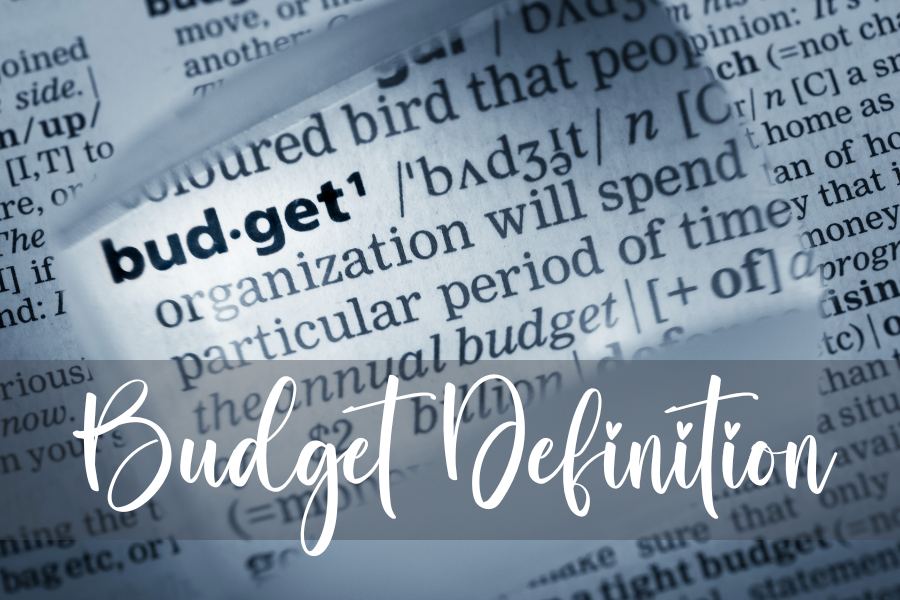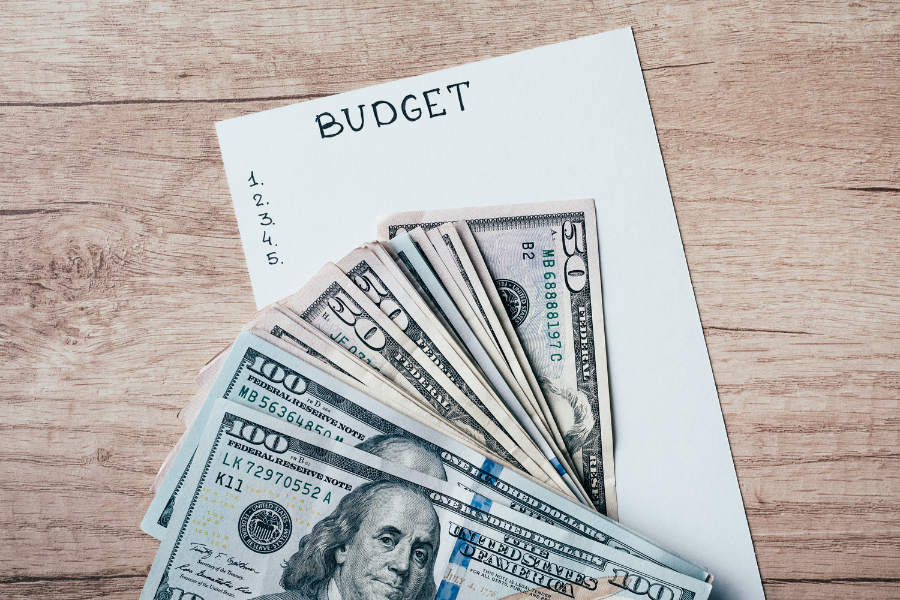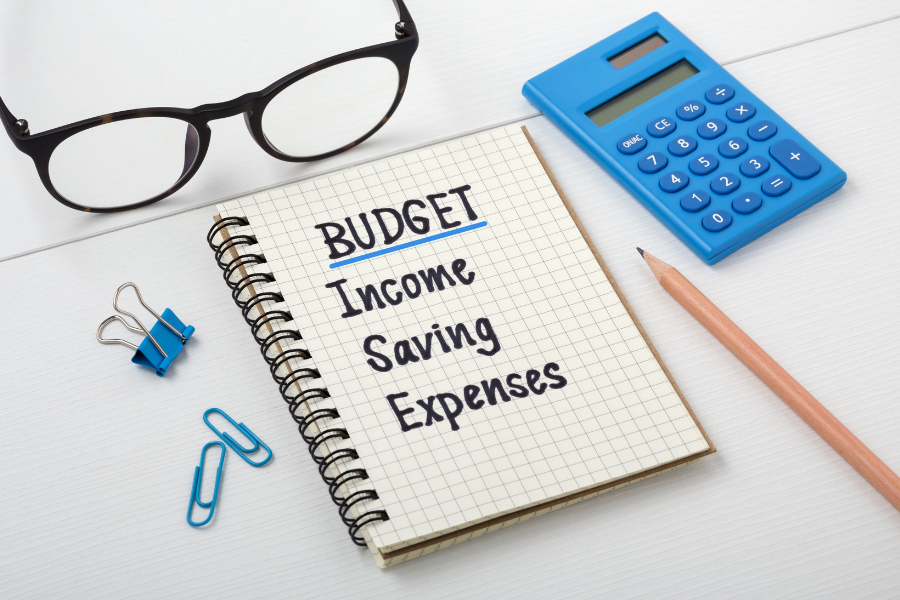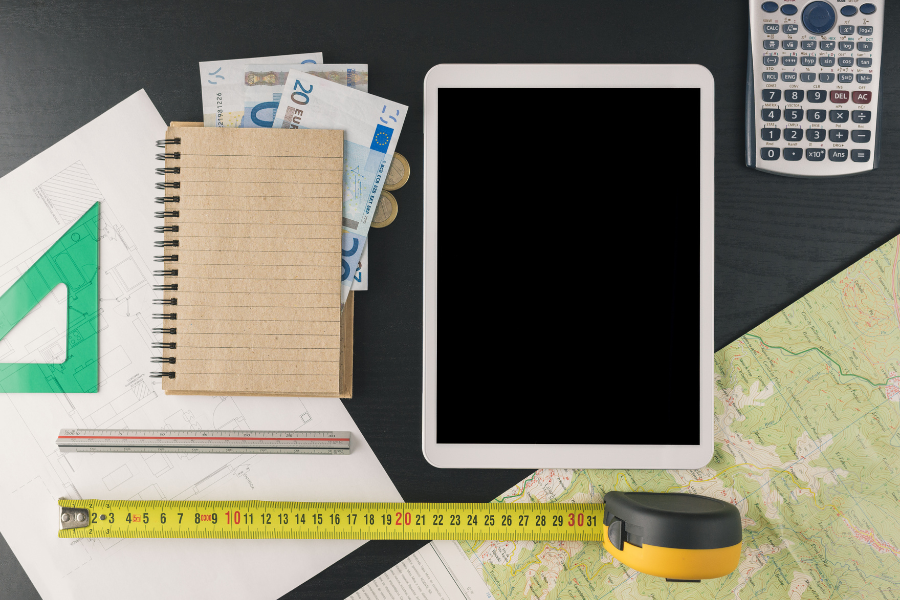This article may contain affiliate links. See our disclaimer for more information.

Welcome to our comprehensive guide on budget definition! In this article, we will delve into the meaning and significance of budgeting in financial planning and management. Understanding the definition of a budget is the first step towards effective budget planning and resource allocation. Let’s explore the world of budgets and discover how they can help you achieve your financial goals.
What is a Budget?

A budget is a financial plan that outlines an organization’s or individual’s anticipated income and expenses over a specified period. It’s basically a roadmap for where your money goes and allows you to make informed financial decisions. By setting spending limits and tracking expenses, a budget facilitates better financial control and helps achieve financial goals.
The Benefits of Budget Planning

Budget planning is a fundamental practice in financial management that yields several advantages for individuals and organizations alike.
Better Control Over Finances
Creating and following a budget allows individuals and organizations to have a clear view of their financial resources and obligations. By setting spending limits and tracking expenses, budget planning promotes a sense of control over finances. It enables individuals to make informed financial decisions and avoid overspending, resulting in improved financial stability.
Improved Decision-Making
One of the key benefits of budget planning is that it facilitates better decision-making. By having a well-defined and structured budget, individuals and organizations can align their financial goals and priorities. They can evaluate the feasibility of various spending options, prioritize expenses, and allocate resources accordingly. This informed decision-making process leads to more efficient allocation of funds and maximizes the return on investment.
Effective Expense Tracking and Monitoring
A crucial aspect of budget planning is expense tracking, which allows individuals and organizations to monitor their spending habits. By tracking expenses against the budgeted amounts, they gain insights into where their money is being allocated. This enables them to identify areas for cost-cutting, reduce unnecessary expenditures, and redirect funds towards more essential priorities. The ability to track and monitor expenses ensures that individuals and organizations stay within their financial limits and make necessary adjustments as needed.
Identification of Areas for Cost-Cutting
With budget planning, individuals and organizations can identify areas where unnecessary expenses and waste can be reduced. By analyzing spending patterns and evaluating the value derived from different expenditures, they can make informed decisions about where to cut costs. This process helps optimize resource allocation and enhances overall financial efficiency.
Financial Stability and Goal Achievement
By diligently implementing budget planning, individuals and organizations can achieve greater financial stability. Budget planning allows them to allocate resources strategically towards their goals, such as savings, debt repayment, investments, or business expansion. It provides a roadmap for achieving these objectives, ensuring progress towards long-term financial security and success.
In summary, budget planning offers several advantages, including better control over finances, improved decision-making, effective expense tracking, identification of areas for cost-cutting, and attainment of financial stability. By implementing a well-structured budget, individuals and organizations can optimize their financial management practices and work towards achieving their financial goals.
The Key Elements of Budgeting

Effective budgeting involves several key elements that are essential for successful financial management. By incorporating these elements into your budgeting process, you can improve your budget management and achieve your financial goals more efficiently.
- Income Estimation: Start by accurately estimating your income sources, including salaries, investments, and any additional revenue streams. This step ensures that you have a clear understanding of how much money you have available to allocate towards your expenses.
- Expense Categorization: Categorize your expenses into different categories such as housing, transportation, utilities, groceries, entertainment, and savings. This categorization helps you track your spending and identify areas where you can potentially cut costs.
- Goal Setting: Set clear financial goals that you want to achieve within a specific time frame. These goals can include saving for a down payment on a house, paying off debt, or creating an emergency fund. Setting goals helps you prioritize your spending and stay focused on your long-term financial objectives.
While budgeting can be a complex process, there are budgeting tools and software available that can simplify the process and enhance your budget management. These tools often provide features such as automatic expense tracking, budget forecasting, and customizable reports, making it easier for you to create and manage your budget effectively.
By incorporating these key elements into your budgeting process and utilizing budgeting tools, you can gain better control over your finances and make informed financial decisions to achieve your desired financial outcomes.
Budget Control and Analysis

Ensuring effective budget management involves two essential components: budget control and budget analysis. Let’s explore both in more detail:
Budget Control
Budget control is an integral part of financial management, as it allows individuals and organizations to stay within their predetermined financial limits. By regularly reviewing actual expenses against the budgeted amounts, one can identify any deviations and take corrective actions as necessary.
Here are some key steps to maintain budget control:
- Track Expenses: It’s important to keep a close eye on all expenses to ensure they align with the budgeted amounts. This can be done using accounting software or budgeting tools.
- Identify Deviations: Regularly compare actual expenses to the budgeted amounts and identify any variations. This helps to pinpoint areas where overspending or unexpected costs may have occurred.
- Take Corrective Actions: Once deviations are identified, it’s crucial to take timely corrective actions. This may involve reducing unnecessary expenditures, finding cost-saving opportunities, or adjusting the budget accordingly.
Budget Analysis
Budget analysis involves assessing the overall financial performance by analyzing the budgeted amounts and actual expenses. This process helps individuals and organizations gain valuable insights into their financial situation and make informed decisions.
Here are some key aspects of budget analysis:
- Identify Trends: Analyzing budget data over time allows for the identification of spending patterns and trends. This can reveal areas where adjustments may be necessary to improve financial control.
- Make Informed Decisions: By leveraging budget analysis, individuals and organizations can make informed decisions regarding resource allocation, investment opportunities, and cost-saving measures.
- Strategic Planning: Budget analysis provides a foundation for strategic financial planning. It helps set realistic financial goals, assess their feasibility, and develop long-term strategies for financial success.
By implementing robust budget control practices and conducting regular budget analysis, individuals and organizations can achieve greater financial control, identify areas for improvement, and make informed decisions to support their overall financial goals.
The Importance of Budget Forecasting

Budget forecasting plays a pivotal role in financial planning and management. By utilizing historical data and anticipated changes, budget forecasting enables individuals and organizations to predict future financial outcomes. This proactive approach helps anticipate potential risks and identify opportunities for growth and expansion.
Better Resource Allocation
One of the key advantages of budget forecasting is its ability to guide resource allocation. By projecting income and expenses, organizations can strategically allocate their resources towards areas that require more funding or investment. This ensures that resources are utilized efficiently, maximizing returns and minimizing wasteful expenditure.
Informed Decision-Making
Accurate budget forecasts provide valuable insights for informed decision-making. By understanding the financial impact of different scenarios, individuals and organizations can make well-informed choices regarding investments, expansion plans, and cost-cutting measures. Budget forecasting serves as a valuable tool for assessing the feasibility and potential outcomes of various financial decisions.
Financial Stability
Budget forecasting plays a crucial role in achieving and maintaining financial stability. By accurately predicting future cash flows, individuals and organizations can plan for contingencies, such as economic downturns or unexpected expenses. This allows for better risk management and the ability to navigate challenging financial situations with greater confidence.
Optimized Financial Goals
Effective budget forecasting enables individuals and organizations to set realistic financial goals and track progress towards achieving them. By aligning future projections with desired outcomes, budget forecasting assists in defining milestones, monitoring performance, and making adjustments as necessary. It helps ensure that financial goals remain attainable and serves as a roadmap for success.
Empowering Decision-Makers
By providing an accurate financial forecast, budget forecasting empowers decision-makers with the information needed to optimize financial strategies. It allows for proactive measures to be taken, such as adjusting budget allocations, exploring new revenue streams, or implementing cost-saving initiatives. Budget forecasting enables individuals and organizations to take charge of their financial future and make data-driven decisions.
Overall, budget forecasting is a critical component of effective financial planning. By predicting future financial outcomes, it aids in better resource allocation, informed decision-making, financial stability, optimized financial goals, and empowering decision-makers. Incorporating budget forecasting into financial strategies can yield significant benefits and contribute to long-term financial success.
Utilizing Budgeting Tools for Effective Management

Managing your budget effectively is crucial for financial stability and achieving your financial goals. Budgeting tools provide a convenient way to streamline the management of your budgets, offering a range of features that can simplify and enhance your budgeting process.
Automated Calculations
One of the key advantages of budgeting tools is their ability to perform automated calculations. These tools can automatically calculate income and expenses, ensuring accurate and up-to-date budget calculations without the need for manual calculations.
Customizable Budget Templates
Budgeting tools often provide customizable budget templates that you can tailor to your specific financial needs. These templates allow you to categorize your income and expenses based on your unique financial situation, making it easier to track and manage your budget effectively.
Expense Tracking Functionalities
Keeping track of your expenses is essential for maintaining a balanced budget. Budgeting tools offer expense tracking functionalities that allow you to record and categorize your expenses. By tracking your expenses, you can identify spending patterns, pinpoint areas where you can cut back, and maintain better control over your finances.
Financial Goal Setting
Setting financial goals is an important part of budget management. Budgeting tools enable you to set specific financial goals, such as saving for a down payment on a house or paying off debt. By setting goals within the tool, you can track your progress, stay motivated, and make informed decisions that align with your financial aspirations.
Progress Monitoring and Reporting
Monitoring your progress is crucial to ensure that you are on track with your budget. Budgeting tools provide progress monitoring features that give you real-time insights into your financial situation. Additionally, these tools often generate detailed reports that provide a comprehensive overview of your budget, making it easier to identify areas for improvement and track your financial progress.
By utilizing budgeting tools, you can effectively manage your budget, track your expenses, set financial goals, and maintain better control over your finances. With the help of these tools, you’ll be well-equipped to achieve your financial objectives and enjoy increased financial stability.
Techniques for Successful Budgeting

Successful budgeting is essential for effective financial planning and management. By adopting the following techniques, individuals and organizations can achieve their desired financial outcomes and maintain financial stability.
Prioritize Expenses
When creating a budget, it’s crucial to prioritize expenses based on their importance. Start with essential expenses such as rent/mortgage, utilities, and groceries. Then allocate funds for discretionary expenses like entertainment and dining out. Prioritizing expenses helps ensure that the most critical financial obligations are met.
Set Realistic Goals
Setting realistic financial goals is key to successful budgeting. Consider both short-term objectives, such as paying off debts, and long-term goals like saving for retirement or purchasing a home. By breaking larger goals into smaller, achievable milestones, individuals and organizations can stay motivated and track their progress effectively.
Regularly Review and Adjust the Budget
Budgets should not be set in stone. It’s essential to review and adjust the budget regularly to reflect changes in income, expenses, and financial goals. Reviewing the budget allows for identifying areas that need improvement, allocating additional funds if necessary, or reallocating resources based on changing priorities.
Consider Short-Term and Long-Term Objectives
When developing and managing a budget, it’s crucial to consider both short-term and long-term financial objectives. Short-term goals may include paying off debt or saving for a vacation, while long-term goals could be retirement planning or investing in higher education. Balancing these objectives helps maintain financial stability while working towards future financial security.
By using these effective budgeting techniques, individuals and organizations can successfully plan and manage their finances. Prioritizing expenses, setting realistic goals, regularly reviewing and adjusting the budget, and considering short-term and long-term objectives are essential steps towards achieving desired financial outcomes.
Overcoming Budgeting Challenges

Budgeting is an essential aspect of financial management that helps individuals and organizations achieve their financial goals. However, it can sometimes be challenging to effectively budget due to various factors.
Unexpected Expenses
One common challenge in budgeting is dealing with unexpected expenses that may arise. These could include emergency home repairs, medical bills, or car maintenance costs. Such unforeseen expenses can disrupt a budget and make it difficult to stick to a financial plan.
Fluctuating Income
Another significant hurdle in budgeting is managing fluctuating income. This situation is commonly faced by individuals with irregular or freelance incomes. It becomes crucial to create a budget that adapts to varying income levels, making it imperative to monitor and adjust expenditure accordingly.
Inadequate Tracking
Tracking and monitoring expenses are vital for successful budgeting. However, inadequate tracking can hinder budget management efforts. Without proper monitoring, it becomes challenging to identify overspending, inefficient expenditures, or areas for cost-cutting.
Fortunately, there are strategies and tools available to help overcome these budgeting challenges.
Using Budgeting Tools
One effective approach is leveraging budgeting tools that offer features designed to simplify the budgeting process. These tools often come with functionalities like automatic expense tracking, customizable budgets, and reporting capabilities. By utilizing budgeting tools, individuals and organizations can streamline the budget management process and gain better control over their finances.
Staying Organized and Flexible
Staying organized is essential for successful budgeting. This means maintaining accurate records of income, expenses, and financial goals. Additionally, flexibility is crucial in adjusting the budget to accommodate unexpected expenses or changes in income. Being prepared to adapt the budget as needed helps overcome challenges and ensures better financial management.
Proactive Approach
Adopting a proactive mindset is key to overcoming budgeting challenges. This involves actively reviewing and analyzing the budget regularly, rather than simply setting it and forgetting it. Regularly monitoring expenses, identifying areas for improvement, and making adjustments proactively helps maintain financial stability and progress towards financial goals.
By implementing these strategies, utilizing budgeting tools, and maintaining a proactive approach, individuals and organizations can navigate budgeting challenges successfully and achieve better budget management.
The Importance of Regular Budget Reviews

Regular reviews of the budget are vital for maintaining financial control and ensuring its effectiveness. By regularly analyzing actual expenses and comparing them to the budgeted amounts, individuals and organizations can:
- Identify areas for improvement:
- Reviewing the budget helps identify areas where expenses can be reduced or optimized. It allows individuals and organizations to pinpoint specific categories or line items that are deviating from the planned budget. This analysis helps identify potential cost-saving opportunities or areas where resources can be reallocated for better efficiency.Eliminate unnecessary expenditures:
- Through budget reviews, individuals and organizations can identify unnecessary or excessive expenses that can be eliminated. This process involves evaluating each expense item and determining its importance and contribution to overall financial goals. By eliminating non-essential expenditures, budgets can be optimized to align with financial priorities.Make informed financial decisions:
Regular budget reviews enable individuals and organizations to make informed financial decisions. By assessing the actual expenses and comparing them to the budgeted amounts, they gain insights into the financial health and performance of various departments or personal spending habits. This information empowers them to make data-driven decisions to improve budget control and allocate resources effectively.
This ongoing monitoring and adjustment of the budget help ensure financial control and adaptability. By reviewing the budget regularly, individuals and organizations can proactively address any deviations, adapt their financial plans accordingly, and maintain a strong financial foundation.
Tips for Long-Term Financial Health

Building long-term financial health requires a combination of strategic financial planning, budget analysis, and disciplined budget management. By following these actionable tips, individuals and organizations can achieve sustainable financial success and make sound financial decisions:
- Set Clear Financial Goals: Start by defining your short-term and long-term financial goals. Whether it’s saving for retirement, purchasing a home, or paying off debt, having clear goals helps prioritize your financial decisions and allocate resources effectively.
- Create a Realistic Budget: Develop a comprehensive budget that accurately captures your income, expenses, and financial obligations. Regularly review and update your budget to ensure it reflects your evolving financial situation, allowing you to stay on track with your goals.
- Track and Analyze Expenses: Keep a detailed record of your expenses and regularly analyze them to identify areas where you can cut costs and save money. This will help you make informed decisions about your spending habits and allocate your resources in the most efficient way.
- Save and Invest: Make saving a habit and consider investing in ways that align with your financial objectives and risk tolerance. A diversified investment portfolio can help grow your wealth over time and provide financial security for the future.
- Manage Debt Wisely: Minimize and manage your debt responsibly. Prioritize paying off high-interest debts first and explore debt consolidation options if necessary. Avoid taking on excessive debt that could hinder your long-term financial health.
- Regularly Review and Adjust: Regularly review your financial progress and adjust your strategies as needed. Analyze your budget, investments, and savings regularly to ensure they align with your goals and adjust them accordingly.
- Seek Professional Advice: Consider consulting with a financial advisor or planner who can provide expert guidance tailored to your specific financial situation and goals. They can help you create a personalized financial plan and provide insights on investment opportunities or tax optimization strategies.
By implementing these tips and consistently practicing good financial habits, you can pave the way for long-term financial security. Remember, financial health is a journey, and these steps can guide you towards achieving your financial aspirations.
Conclusion

In conclusion, budgeting is a fundamental aspect of effective financial planning and management. By understanding the definition of a budget and its essential components, individuals and organizations can achieve greater control over their finances and make informed decisions. Budget planning allows for the allocation of financial resources, ensuring that funds are appropriately distributed to meet various needs and goals. Expense tracking helps monitor spending patterns and identify areas where adjustments may be necessary.
By leveraging budgeting tools, such as automated calculations and customizable templates, individuals and organizations can streamline the budget management process and gain better visibility into their financial situation. These tools also facilitate budget forecasting, enabling users to anticipate future income and expenses and make proactive financial decisions. Regular budget reviews and analysis ensure that the budget remains aligned with financial goals and allows for necessary adjustments to maximize its effectiveness.
In summary, budgeting is a powerful tool for financial stability and long-term fiscal health. By implementing budgeting practices and utilizing the available tools and resources, individuals and organizations can achieve greater financial control, allocate resources effectively, track expenses diligently, and analyze their budget to make informed decisions. Budgeting is an ongoing process that requires dedication and flexibility, but its benefits are invaluable in achieving one’s financial goals and maintaining financial well-being.





